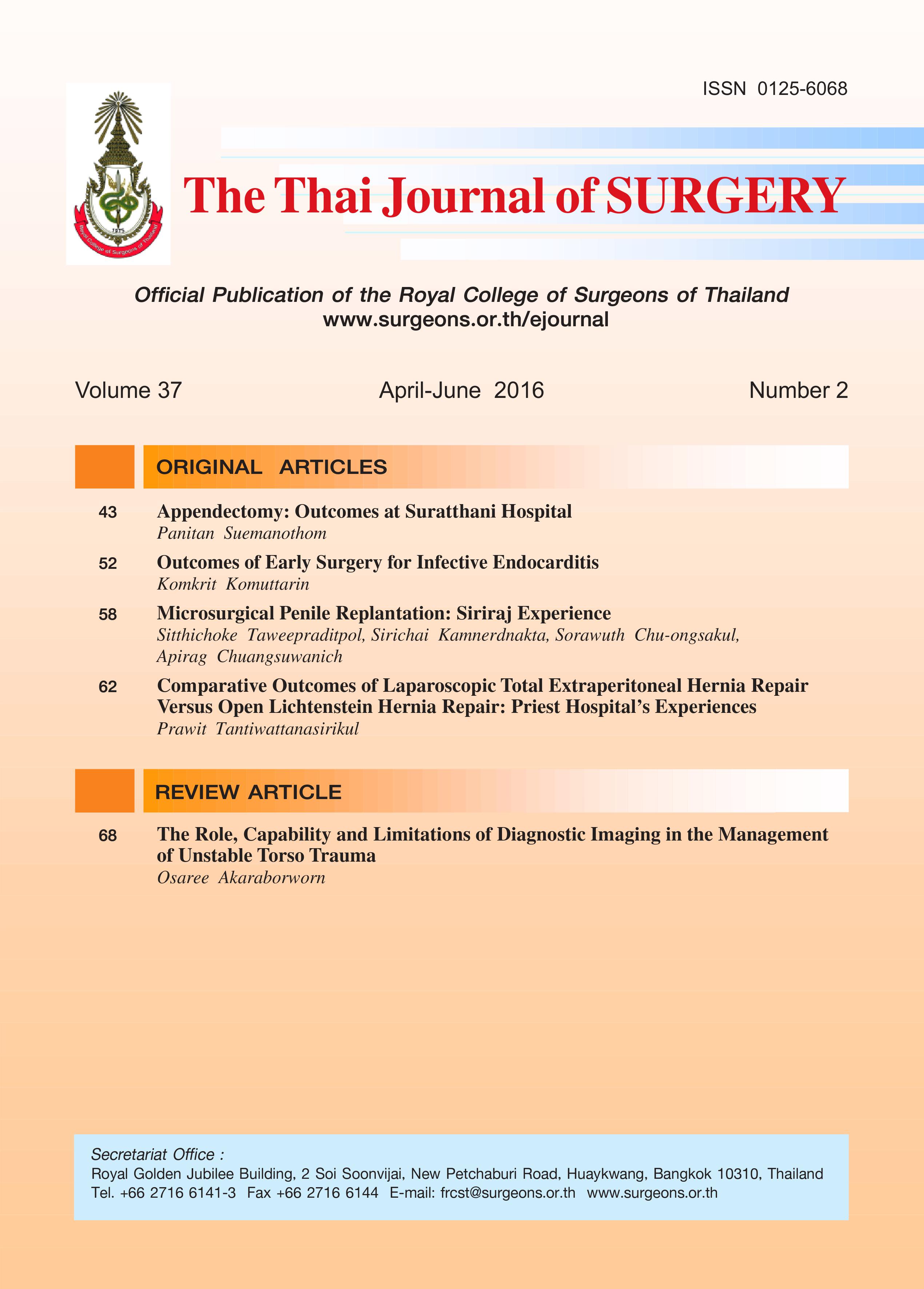Outcomes of Early Surgery for Infective Endocarditis
Keywords:
Infective endocarditis, surgical outcomeAbstract
Background: There is no evidence regarding the optimal timing for surgery for infective endocarditis. The decision to perform surgery mostly depends on the surgeon’s opinion. The authors conducted this study to compare the outcomes of patients who underwent surgery within 14 days after established diagnosis and those who underwent surgery later than 14 days.
Methods: The authors retrospectively collected the data of patients who were diagnosed with definitive and possible infective endocarditis from 31 January 2008 to 1 May 2015. There were 170 patients. Surgery was performed in 110 patients. The outcomes of surgery between the patient groups whose surgery was performed within 14 days (early surgery group) and later (late surgery group) were compared.
Results: There were 110 patients who underwent surgery. There were 16 deaths in this group (14.5%). There were 60 patients who underwent medical treatment alone. In this group, there were 18 deaths (30%). The mortality rates in the early surgery group and the late surgery group were 17.4% and 10%, respectively, so the mortality in the early surgery group was higher with the odds ratio of 3.85. Nevertheless, the difference was not statistically significant (OR = 3.85, 95% CI: 0.58 - 25.6). The complications after surgery, length of ICU stay, and length of hospital stay were similar. However, the authors found that EuroSCORE and size of vegetation were statistically higher in the early surgery group.
Conclusion: Comparing the mortality rate of infective endocarditis, the authors found that the mortality rate in the early surgery group was higher than the late surgery group. However, the difference was not statistically significant.
References
2. Mylonakis E, Calderwood SB. Infective endocarditis in adults. N Engl J Med 2001;345(18):1318-30.
3. Delahaye F. Is early surgery beneficial in infective endocarditis? A systematic review. Arch Cardiovasc Dis 2011;104(1):35-44.
4. Mourvillier B, Trouillet JL, Timsit JF, Baudot J, Chastre J, Regnier B, et al. Infective endocarditis in the intensive care unit: clinical spectrum and prognostic factors in 228 consecutive patients. Intensive Care Med 2004;30(11):2046-52.
5. Funakoshi S, Kaji S, Yamamuro A, Tani T, Kinoshita M, Okada Y, et al. Impact of early surgery in the active phase on longterm outcomes in left-sided native valve infective endocarditis. J Thorac Cardiovasc Surg 2011;142(4):836-42 e1.
6. Moon MR, Miller DC, Moore KA, Oyer PE, Mitchell RS, Robbins RC, et al. Treatment of endocarditis with valve replacement: the question of tissue versus mechanical prosthesis. Ann Thorac Surg 2001;71(4):1164-71.
7. Vilacosta I, Graupner C, San Roman JA, Sarria C, Ronderos R, Fernandez C, et al. Risk of embolization after institution of antibiotic therapy for infective endocarditis. J Am Coll Cardiol 2002;39(9):1489-95.
8. Prendergast BD, Tornos P. Surgery for infective endocarditis: who and when? Circulation 2010;121(9):1141-52.
9. Eishi K, Kawazoe K, Kuriyama Y, Kitoh Y, Kawashima Y, Omae T. Surgical management of infective endocarditis associated with cerebral complications. Multi-center retrospective study in Japan. J Thorac Cardiovasc Surg 1995;110(6):1745-55.
10. Matsushita K, Kuriyama Y, Sawada T, Yamaguchi T, Nagata S, Kawazoe K, et al. Hemorrhagic and ischemic cerebrovascular complications of active infective endocarditis of native valve. Eur Neurol 1993;33(3):267-74.
11. Gillinov AM, Shah RV, Curtis WE, Stuart RS, Cameron DE, Baumgartner WA, et al. Valve replacement in patients with endocarditis and acute neurologic deficit. Ann Thorac Surg 1996;61(4):1125-9; discussion 30.
12. Byrne JG, Rezai K, Sanchez JA, Bernstein RA, Okum E, Leacche M, et al. Surgical management of endocarditis: the society of thoracic surgeons clinical practice guideline. Ann Thorac Surg 2011;91(6):2012-9.
13. Renzulli A, Carozza A, Marra C, Romano GP, Ismeno G, De Feo M, et al. Are blood and valve cultures predictive for long-term outcome following surgery for infective endocarditis? Eur J Cardiothorac Surg 2000;17(3):228-33.
14. Delahaye F, Célard M, Roth O, de Gevigney G. Indications and optimal timing for surgery in infective endocarditis. Heart 2004;90(6):618-20.
15. Hoen B, Alla F, Selton-Suty C, Beguinot I, Bouvet A, Briancon S, et al. Changing profile of infective endocarditis: results of a 1-year survey in France. JAMA 2002;288(1):75-81.
16. Kang D-H, Kim Y-J, Kim S-H, Sun BJ, Kim D-H, Yun S-C, et al. Early Surgery versus Conventional Treatment for Infective Endocarditis. N Engl J Med 2012;366(26):2466-73.
17. Kim DH, Kang DH, Lee MZ, Yun SC, Kim YJ, Song JM, et al. Impact of early surgery on embolic events in patients with infective endocarditis. Circulation 2010;122(11 Suppl):S17-22.
Downloads
Published
How to Cite
Issue
Section
License
Articles must be contributed solely to The Thai Journal of Surgery and when published become the property of the Royal College of Surgeons of Thailand. The Royal College of Surgeons of Thailand reserves copyright on all published materials and such materials may not be reproduced in any form without the written permission.



